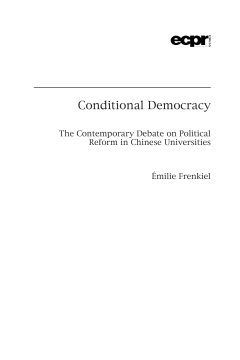
Additional Information
Book Details
Abstract
Little is known about the political views of non-dissident Chinese intellectuals. For this book, Émilie Frenkiel has been granted unprecedented access to the discussions of politically committed Chinese who have been part of the intellectual debate on post-Tiananmen reform. Her in-depth research elicits lively views that reflect the yearnings and fears of the country’s political elite, and reveal the diversity of approaches to China’s democratisation. 'In the west, where most of us think that democracy based on competitive elections is mankind’s ultimate and inevitable political journey’s end, we tend to hear only the opinions of Chinese who share our beliefs. Émilie Frenkiel’s book gives voice to a large number of prominent Chinese academics, helping us better understand ‒ without reinforcing our prejudices ‒ what that country’s academic elite thinks about their present and prospective political system. This rich, informative and refreshing inquiry will help us view the contemporary political debate in China through less distorted lenses.' Pasquale Pasquino, New York University Émilie Frenkiel’s book thoroughly renews our understanding of the Chinese debate on democracy and political reform – a debate often simplistically presented in the West through typologies differentiating ‘liberalism’, ‘new left’ or ‘cultural nationalism’. She studies the biographical itineraries, the works, the modes of involvement in public debate and the relationship with the political authorities of twenty prominent intellectuals, and she uncovers rarely studied realities: how the ‘market of ideas’ works, how to have influence on leaders, and in particular how to spell out acceptable criticisms in the Chinese context. She also originally shows that beyond the diversity of viewpoints, Chinese intellectuals share a technocratic vision of politics, an obsession with the meritocratic ideal and an approach to democracy based on capacity – on the conviction that the Chinese population is not yet up to the task of electing its leaders. A milestone.' Pierre Rosanvallon, Collégrave;ge de France 'The official political discourse in China is uniform and, to be frank, boring. Over the last three decades, however, Chinese intellectuals have been carrying out fascinating and often heated debates about China's political future. Drawing on extensive interviews with the key players, Émilie Frenkiel brings these debates to light. Thought-provoking and balanced, this book is essential reading for anyone who wants to learn more about China's political possibilities.' Daniel A Bell, Tsinghua University, Beijing Émilie Frenkiel’s book is fascinating for all scholars that work on, or are interested in, China, but it will also be of interest for political theorists. The debate among Chinese intellectuals – especially political scientists active in the public sphere – shows how they are trying to conceptualise an original path to democracy in the twenty-first century, and demonstrates clearly that beyond the rule of the CCP, the country is moving politically very fast. This provincialises Europe and the USA: part of this debate is highly specific, but another one echoes the search for an answer to the crisis of political representation in Western countries. A book that helps us to better understand the world we live in.' Yves Sintomer, Université; Paris 8
Table of Contents
| Section Title | Page | Action | Price |
|---|---|---|---|
| Conditional Democracy | i | ||
| Contents | v | ||
| Selective Timeline of Major Historical Events | vii | ||
| Acknowledgements | xi | ||
| Introduction | 1 | ||
| Chapter One Horses in a Pen? The Situation of Chinese Academics | 13 | ||
| Chapter Two Two Generations of Committed Scholars | 47 | ||
| Chapter Three Ideas - A Market or a Battle? | 77 | ||
| Chapter Four Assessment of the Reforms and Reawakening of the Intelligentsia | 115 | ||
| Chapter Five Which Model of Democratisation is Best for China? The Debate | 149 | ||
| Chapter Six Democratisation with Chinese Characteristics? | 177 | ||
| Chapter Seven Conclusion | 213 | ||
| Appendix | 219 | ||
| Glossary | 253 | ||
| Index | 259 |
